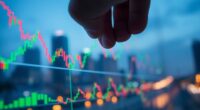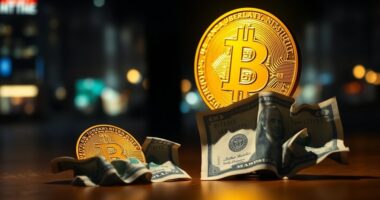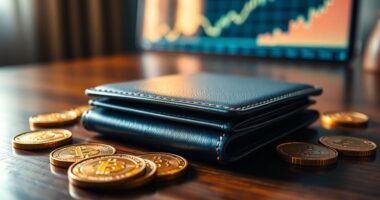Robert Kiyosaki believes Bitcoin outshines the US dollar, especially in today's unpredictable economy. With its capped supply, he sees Bitcoin as a safeguard against inflation and devaluation. As traditional currencies face mounting volatility, Kiyosaki is increasing his Bitcoin investments. What drives his confidence in this digital asset, and how does it compare to conventional financial systems? The answers might surprise you.

In today's rapidly changing financial landscape, many investors are questioning the safety of their assets, and Bitcoin is emerging as a compelling alternative to the US dollar. Robert Kiyosaki, a well-known financial educator, has voiced strong support for Bitcoin, declaring it a safer option than traditional fiat currencies. You might wonder why he—and others—are increasingly drawn to cryptocurrency in a world where economic uncertainties loom large.
Let's start with volatility. Yes, Bitcoin is more volatile than assets like gold, which can make it a risky choice for those seeking stability. However, Kiyosaki argues that, despite its price fluctuations, Bitcoin offers a unique opportunity for growth. With inflation concerns surrounding the US dollar, many investors see Bitcoin as a hedge against economic instability. The historical performance of Bitcoin shows resilience over time, drawing in those who seek alternative assets to safeguard their wealth. Furthermore, Bitcoin's limited supply of 21 million coins contributes to its appeal as a hard asset in an inflationary environment, making it a strategic choice for diversification in IRAs.
Another factor is security. While it's true that Bitcoin exchanges have faced hacking risks, the underlying blockchain technology provides a secure ledger that reduces fraud potential. You might feel apprehensive about managing your own cryptocurrency, given the self-custody risks involved. However, many believe that taking control of your assets can ultimately offer more security than relying solely on traditional banking systems, which aren't immune to risks either.
Economic and political factors further complicate the landscape. Gresham's Law suggests that bad money drives out good, prompting some to view Bitcoin favorably compared to the US dollar. Additionally, with government policies influencing the dollar's value—like monetary printing and sanctions—many see Bitcoin as a decentralized alternative that could offer more stability amidst uncertainty. The growing global adoption of Bitcoin also strengthens its position, as more users contribute to its network value.
Investor confidence plays a significant role too. Many people currently view the US dollar as less secure, prompting them to explore assets like Bitcoin and gold. The rapid shifts in market sentiment can alter perceptions about Bitcoin's safety, but Kiyosaki's bullish stance resonates with those seeking growth opportunities outside traditional assets.
As regulations evolve, Bitcoin's attractiveness as an investment may continue to rise, especially in a world filled with economic unpredictability.









